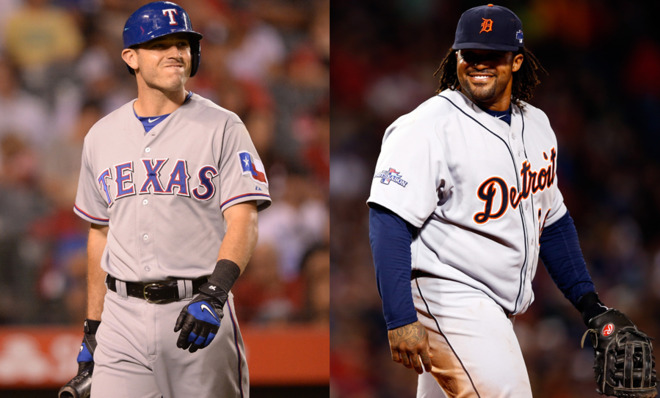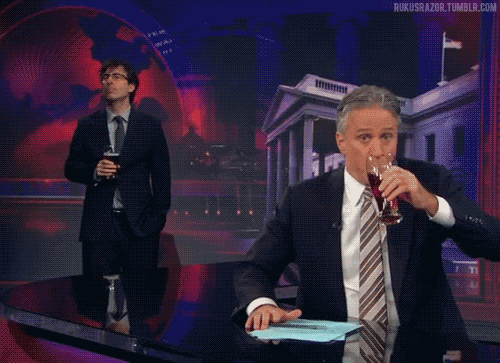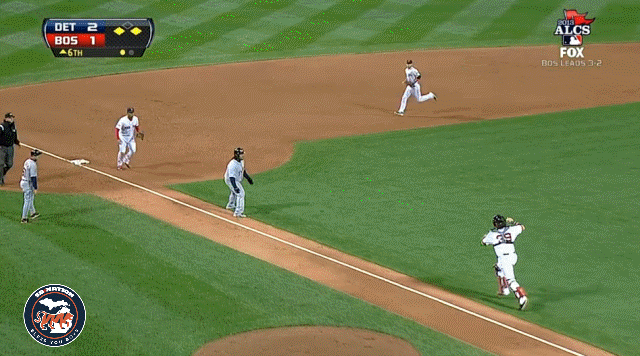Fielder for Kinsler: A megadeal so crazy it just might work
A rare blockbuster trade that should benefit both teams


A free daily email with the biggest news stories of the day – and the best features from TheWeek.com
You are now subscribed
Your newsletter sign-up was successful
The Tigers and Rangers pulled off the first blockbuster deal of the offseason Wednesday, with Detroit sending Prince Fielder and cash to Texas straight up for Ian Kinsler. The immediate reaction from the internet was, more or less, this:

While indeed shocking — Fielder is one of four $200 million men in baseball history, and only the second to be traded while under contract — the deal actually makes a lot of sense for both teams. After both had disappointing finishes to 2013, the swap should position the two clubs to remain highly competitive in the near future, without sacrificing their long-term health.
In other words, it's a rare win-win for everyone involved.
The Week
Escape your echo chamber. Get the facts behind the news, plus analysis from multiple perspectives.

Sign up for The Week's Free Newsletters
From our morning news briefing to a weekly Good News Newsletter, get the best of The Week delivered directly to your inbox.
From our morning news briefing to a weekly Good News Newsletter, get the best of The Week delivered directly to your inbox.
For the Tigers, the trade rids them of a bloated nine-year contract that, after only two seasons, was starting to look like a Prince Fielder-sized mistake. The first baseman had another seven years and $168 million left on his deal, and his production more than halved last year from the year prior.
Fielder should be in for a bounce-back season, but the aging curve for corpulent first basemen with the agility of refrigerators doesn't bode well for the final years of the contract, when Fielder will be raking in $24 million annually.
In clearing all that money off the books — they're sending only $30 million to Texas to cover part of what Fielder is owed — Detroit can now spend heavy to retain reigning AL Cy Young-winner Max Scherzer, lock up Miguel Cabrera past 2015, or pick up more pieces.
Moving Fielder also fixes Detroit's redundancy problem. The team essentially played three DHs at once in Fielder, Miguel Cabrera, and Victor Martinez, all of whom are gifted hitters but liabilities at everything else. The American League Championship Series laid that glaring fault bare, when a spate of fielding miscues in the bottom of the ninth inning of Game 2 — Fielder and Cabrera combined to miss three routine plays — allowed Boston to walk off with a win.
A free daily email with the biggest news stories of the day – and the best features from TheWeek.com
Base-running challenges may have cost Detroit Game 5 as well, and they featured prominently in Game 6 when Fielder offered up his version of fall down go boom:

Cabrera moved from first to third to accommodate the Fielder signing, and can now move back across the diamond where he'll do less harm.
Oh, and the Tigers plugged a big gap in the middle of their infield with an above-average second baseman who's got some pop in his bat. There are legitimate questions about Kinsler's decline — at 31, he just finished a season in which he put up the lowest home run and power totals of his career, excepting an injury-shortened 2010. But he's still projected to be a very good middle infielder next year.
Plus, he's signed to a reasonable contract through only 2017. Not a bad pickup.
As for the Rangers, the deal helps them as well, though not quite so dramatically.
First, it adds much-needed power to a lineup whose solid numbers last year were an illusory product of playing in a homer-happy home ballpark. When weighted for park effects, the Rangers were a pretty average offense.
Fielder hit 55 homers the past two years in cavernous Comerica, and should hit more in Rangers Ballpark's friendlier dimensions. It helps, too, that he's a left-handed bat coming into a right-heavy lineup.
The trade also clears up a logjam in the middle of Texas' infield. In addition to Kinsler, the Rangers had Elvis Andrus (under contract through 2023(!)) and Jurickson Profar (Baseball America's top prospect in the game last year) vying for playing time.
By moving Profar to second base from his natural short, Texas will have a great double-play combo up the middle. And with Fielder slotting in at first, and Adrian Beltre returning at third, Texas should get some decent offensive production from everyone in the infield.
Texas and Detroit each had an extraneous piece the other team needed. Neither one had to give up any prospects, and though Texas will be taking on a big financial commitment in Fielder, they can more than pay for it thanks to their enormous new TV deal.
Everybody wins. Except, you know, everyone who has to play against those two revamped teams next year.
Jon Terbush is an associate editor at TheWeek.com covering politics, sports, and other things he finds interesting. He has previously written for Talking Points Memo, Raw Story, and Business Insider.
-
 Buddhist monks’ US walk for peace
Buddhist monks’ US walk for peaceUnder the Radar Crowds have turned out on the roads from California to Washington and ‘millions are finding hope in their journey’
-
 American universities are losing ground to their foreign counterparts
American universities are losing ground to their foreign counterpartsThe Explainer While Harvard is still near the top, other colleges have slipped
-
 How to navigate dating apps to find ‘the one’
How to navigate dating apps to find ‘the one’The Week Recommends Put an end to endless swiping and make real romantic connections
